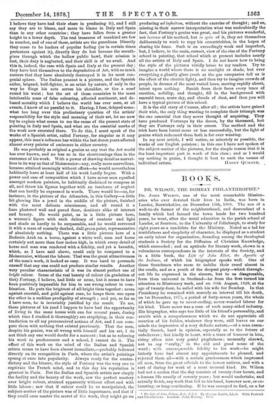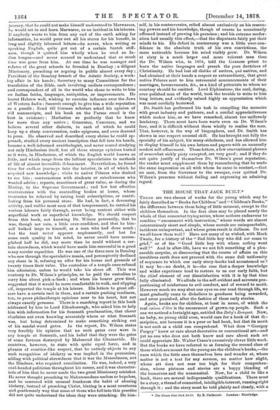BOOKS.
DR. WILSON, THE BOMBAY PHILANTHROPIST.*
Dn. JOHN WILSON, one of the most remarkable Mission- aries who ever devoted their lives to India, was born in Lauder, Berwickshire, on December 11th, 1804. The son of a well-to-do farmer of the neighbourhood, and descendant of a family which had farmed the town lands for two hundred years, he went, after the usual education in the parish school of Lauder, at fourteen, to the University of Edinburgh, to study for eight years as a candidate for the Ministry. Noted as a lad for truthfulness and simplicity of character, he displayed as a student an early talent for organisation, founding among the theological students a Society for the Diffusion of Christian Knowledge, which succeeded ; and an aptitude for literary work, shown in a voluminous correspondence in the interests of the Society, and in a little book, the Life of John Eliot, the Apostle of the Indians, of which his biographer speaks well. One of those Scotchmen who seem to imbibe their creed almost in the cradle, and as a youth of the deepest piety—which through- out life he expressed in the sincere, but to us disagreeable, form then universal in Scotland—he from the first turned his attention to Missionary work, and on 30th August, 1828, at the age of twenty-four, he sailed with his wife for Bombay. In that Presidency he remained with scarcely an interval till his death, on 1st December, 1875, a period of forty-seven years, the whole of which he gave up to never-ending, never-wearied labour for his kind. There never was a man of such many-sided industry. His biographer, who says too little of his friend's personality, and avoids with a scrupulousness which we do not appreciate all mention of his foibles, whatever they were, still leaves on our minds the impression of a very definite nature,—of a man essen- tially Scotch, hard in opinion, especially as to the future of unbelievers; but kindly in heart, with a trace of humour in him, rising often into very genial playfulness ; unusually shrewd, not to say "crafty," in the old and good sense of the word ; with unconquerable fidelity to his work—he might latterly have had almost any appointments he pleased, and rejected them all—with a certain graciousness which impressed all men, from the great officials to the lowest natives, and with a sort of daring for work of a most unusual kind. Dr. Wilson had not a notion that the day consists of twenty-four hours, and a human life usually of seventy years ; but would undertake, and actually finish, any work that fell to his band, however new, or ex- hausting, or long-continuing. If lie was annoyed to find, on a far • The Life of John Wilion, D.D., F.R.S. By George Smith, LL.D. With Portrait and Illustration°. London: John Murray. 1178. journey, that he could not make himself understood to Marwarees, he would set to and learn Marwaree, as an incident in his labours. If anybody wrote to him from any end of the earth asking for information, he would pour out all his stores for his benefit, in long and slightly laboured letters—he never, when writing or speaking English, quite got out of a certain Scotch stiff- ness, though it quitted him wholly when he used an In- dian tongue—and never seemed to understand that so much time was gone from him. At one time he was manager and referee of the great schools he founded in Bombay ; a diligent Missionary, preaching or arguing in public almost every day ; President of the Bombay branch of the Asiatic Society, a work- ing affair in his hands ; Secretary to many Committees for the translation of the Bible, each involving endless correspondence ; and correspondent of all in the world who chose to write to him on Indian faiths, languages, antiquities, or improvements. He learnt Hebrew well, wishing to exercise influence over the Jews of Western India ; Sanscrit enough to give him a wide reputation as a pundit ; Zend till German scholars asked his opinion of old manuscripts, and his book on the Parsee creed is the best in existenca ; Marhattee so perfectly that he knew far more than any native ; Guzeratee, Concanee, and we believe several other dialects, in each of which he could keep up a sharp conversation, make epigrams, and even descend to puns. lie observed and described every shrine he could ap- proach, studied every ancient inscription that fell into his hands, became a well-informed ornithologist, and never ceased studying not only Ilindooism itself, but all those strange opinions buried as it were, in Hindooism, of which the English world knows so little, and which range from the loftiest speculations to methods of life of almost incredible debasement. Nevertheless, he found time for endless journeys into the interior, in all of which he acquired new knowledge ; visits to native Princes who desired to see him ; conversations with students or catechumens who wanted advice ; reports, sometimes of great value, as during the Mutiny, to the Supreme Government ; and few but effective controversies with the controlling bodies at home, whose treasuries he relieved by raising local subscriptions, or contri- buting from his personal store. He had, in fact, a devouring activity, and unlike most men of that temperament, he carried his various labours fairly through, never being content either with superficial work or superficial knowledge. We should suspect from this book, not knowing Dr. Wilson personally, that he was, though not vain, a little over-confident, and that he him- self bulked large to himself, as a man who had done much ; but the trait never appears unpleasantly, and but for some such quality in his mind, he never could have accom- plished half he did, any more than he could without a cer- tain shrewdness, which would have made him successful in a good many secular capacities. He was one of the three men in Bombay who saw through the speculative mania, and peremptorily declined any share in it, refusing an offer for his house and grounds of twenty times their value. The custodian of a temple once refused him admission, unless he would take his shoes off. This was contrary to Dr. Wilson's principles, so he paid the custodian to carry him about pick-a-back ; and when his bearer grew tired, suggested that it would be more comfortable to walk, and slipping off, inspected the temple at his leisure. His letters to great offi- cers have a certain tact in them, and a certain pushing readiness, too, to press philanthropic opinions near to his heart, but not always exactly germane. There is a smashing report in this book addressed by him to Lord Ellenborough, who asked him to help him with information for his Somnath proclamation, that clever charlatan not even knowing accurately where or what Somnath was, but being determined to make something striking out of his sandal-wood gates. In the report, Dr. Wilson states very forcibly his opinion that no such gates ever were in any temple at Somnath, and his belief that they were the gates of some fortress destroyed by Mahmoud the Ghaznavide. He contrives, however, to state with quite equal force, and in phrases of courtier-like respect, that he entirely objects to any such recognition of idolatry as was implied in the procession, adding with political shrewdness that it was the Mussulmans, not the Hindoos, who required conciliation. He was, indeed, a very cool-headed politician throughout his career, and it was character- istic of him that he never made the two great Missionary mistakes. He never thought preaching to Mahommedans useless or hopeless, and he censured with unusual frankness the habit of abusing idolatry, instead of preaching Christ, hinting in a most courteous and gentlemanly way that some of those who fell into this practice did not quite understand the ideas they were attacking. He him-
self, in his controversies, relied almost exclusively on his reason- ing powers and his knowledge, though of course he occasionally affirmed instead of proving his premises ; and his extreme moder- ation had usually this effect,—that the disputants fairly put their minds to his. His defect in controversy was a little over-con- fidence in the absolute truth of his own convictions, the more noticeable because his mind visibly grew. Dr. Wilson at sixty is a much larger and more tolerant man than the Dr. Wilson who, in 1834, told the Goanese priest to learn the native languages and preach the pure doctrines of Christianity. He had lost all dislike of natives, qua natives, and had obtained at their hands a respect so extraordinary, that great native Princes sent to him ceremonial announcements of their marriages, bereavements, &c., as a kind of potentate to whom no. courtesy should be omitted. Lord Elphinstone, the cool, daring, over. polished man of the world, took the trouble to write to him long letters, and evidently valued highly an appreciation which was most cordially bestowed.
Dr. Smith has performed his task in compiling the memoirs with great industry and patience, and a cordial appreciativeness which makes him, as we have remarked, almost too uniformly laudatory. There must have been warts even on Dr. Wilson's face, and it is difficult without them wholly to realise the man. That, however, is the way of biographers, and Dr. Smith has shown in one respect unusual skill. He has brought out fully the specialty of his subject, his many-sidedness, and has allowed him to display himself in his own letters and papers with an unusually modest self-effacement. Those letters, a few conventional phrases of somewhat sickly piety excepted, are very good ; and if they do notquite justify of themselves Dr. Wilson's great reputation, the reader must supplement them by remembering that he made the same impression on all with whom he came in contact,—that no man, from the Governor to the sweeper, ever quitted Dr.. Wilson's presence without feeling and expressing an admiring regard.







































 Previous page
Previous page